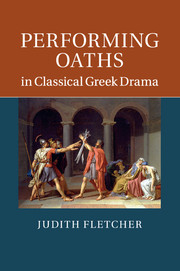Book contents
- Frontmatter
- Contents
- Acknowledgments
- A note on abbreviations
- Introduction
- Chapter 1 From curses to blessings: horkos in the Oresteia
- Chapter 2 Speaking like a man: oaths in Sophocles’ Trachiniae and Philoctetes
- Chapter 3 Horkos in the polis: Athens, Thebes and Sophocles
- Chapter 4 Perjury and other perversions: Euripides’ Phoenissae, Orestes and Cyclops
- Chapter 5 Twisted justice in Aristophanes’ Clouds
- Chapter 6 Women and oaths in Euripides
- Chapter 7 How to do things with Euripides: Aristophanes’ Thesmophoriazusae
- Chapter 8 Swearing off sex: the women's oath in Aristophanes’ Lysistrata
- Conclusion
- Bibliography
- Index locorum
- General index
Chapter 4 - Perjury and other perversions: Euripides’ Phoenissae, Orestes and Cyclops
Published online by Cambridge University Press: 05 December 2011
- Frontmatter
- Contents
- Acknowledgments
- A note on abbreviations
- Introduction
- Chapter 1 From curses to blessings: horkos in the Oresteia
- Chapter 2 Speaking like a man: oaths in Sophocles’ Trachiniae and Philoctetes
- Chapter 3 Horkos in the polis: Athens, Thebes and Sophocles
- Chapter 4 Perjury and other perversions: Euripides’ Phoenissae, Orestes and Cyclops
- Chapter 5 Twisted justice in Aristophanes’ Clouds
- Chapter 6 Women and oaths in Euripides
- Chapter 7 How to do things with Euripides: Aristophanes’ Thesmophoriazusae
- Chapter 8 Swearing off sex: the women's oath in Aristophanes’ Lysistrata
- Conclusion
- Bibliography
- Index locorum
- General index
Summary
Stripped to its bare bones the oath is a curse waiting to happen. Perjurers cannot outrun swift-footed Horkos, warns an anonymous tragic poet (fr. 333a). The admonishment is repeated by the Pythia in the Herodotean account of Glaucus, the Spartan who considered cheating by means of an oath: the son of Horkos, she warns, is swift to punish the perjurer with annihilation of his family and household. Empedocles (B. 115) ranks the crime of epiorkia (perjury) with homicide. Perjurers, according to Aristophanes, wallow in the same Stygian dung as the most heinous criminals (Frogs 145--50, 274–5); Aristotle ranks them amongst the worst sort of betrayers (Rhet., 1375a10). Greek literature is unanimous in condemning perjury and in warning that the violation of oaths will be punished. As we have already noted, Homer provides a darkly shaded backdrop to the downfall of the Trojans by having them breach their oath-truce. Perjury was not just a literary trope, either. In fifth-century Athens the charge of epiorkia provided ammunition against one's rivals or enemies in gambits of one-upmanship. Alcibiades, exploiting the cultural stigma of the forsworn oath, persuaded the Athenian demos in 419/18 bce to add this inscription under the stele recording the Peace of Nicias:
οὐκ ἐνέμειναν οἱ Λακεδαιμόνιοι τοῖς ὅρκοις.
The Spartans have not kept their oaths.
(Thuc. 5.56.3)
An uneasiness about oath-breaking may explain why Aeschylus, Sophocles and Aristophanes seldom engage directly with the forsworn oath, at least in their extant plays. Depicting perjury in the theater of Dionysus is a tricky business apparently, and Euripides is distinctive in this respect; he keeps returning to the challenges of keeping an oath, and is unique in depicting both the performance of perjury and its consequences.
Phoenissae, Orestes and Cyclops, all probably staged between 411 and 408 bce during the waning of the Athenian empire, each feature some form of perjury in the context of civic decay and political corruption. These were tumultuous times for the Athenians, who had experienced a disaster in Sicily, a short-lived oligarchic revolution, and then its repercussions and reprisals. Accounts of the period suggest that life imitated art (or at least that the historians were influenced by literature), since the oath helps to structure the historical narratives of this turbulent period, just as they signpost important events in tragedy. Clever Alcibiades knew how to manipulate cultural anxiety about the oath. In 415, a few years after he persuaded the Athenians to chide the Spartans for breaking their oaths, he convinced the demos that they had to honor their own oaths of alliance and invade Sicily. Persuaded by this argument, the Athenians sent ships to assist the Egestans and Leontines against the Syracusans (Thuc. 6.18.1–19.1). The assembly who agreed that these oaths must be kept were the same citizens who sat in the audience and watched the three plays that we discuss in this chapter. In 410/9 they had collectively sworn the oath of Demophantus just before the City Dionysia, and vowed to kill any man who overthrew the democracy or who held office after the revolution. While the events of the revolution and counter-revolution still hung in the air, the citizen audience who had very recently sworn this oath, guaranteed by sacrifices and inscribed on a public stele, must have been nervously attuned to the power of horkos. As we have already noted, their political identity was to a very large degree regulated by oaths that they had sworn in various public venues and for a range of civic purposes. The oath to maintain the democracy illustrates how closely linked horkos was with the well-ordered polis in the minds of its citizens. Accordingly perjury is associated with strife, an idea that goes as far back as Hesiod's squabbling Iron Age men who had no respect for oaths (WD 194). This passage may have influenced Thucydides (3.83) in his description of the stasis that preceded the Peloponnesian war when “no guarantee could be given that would be trusted, no oath sworn that people would not fear to break.” Of course there is no question that the oath can bind men together for conspiratorial purposes, as the sunomotoi, or subversive groups who had sworn to bring down the Athenian democracy, illustrate (Thuc. 8.81.2). Yet tragedy privileges the oath as a constructive force, making the contrast with the oath-breaker all the more extreme.
- Type
- Chapter
- Information
- Performing Oaths in Classical Greek Drama , pp. 123 - 157Publisher: Cambridge University PressPrint publication year: 2011



